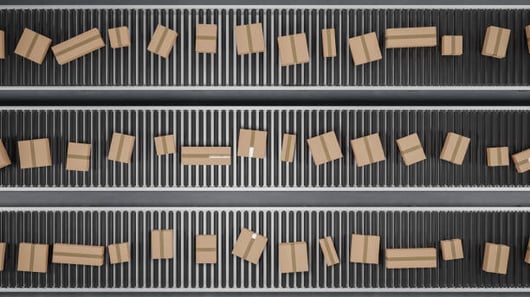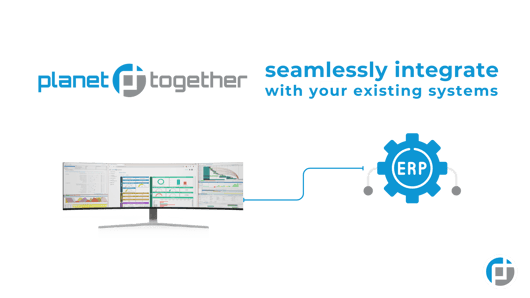
Tackle Tariff Volatility in Packaging Manufacturing: How Manufacturing IT Can Stay Ahead with Integrated APS Solutions
Tariffs and trade barriers have become a moving target for manufacturers across the globe. In packaging and containers manufacturing, where raw materials like plastics, aluminum, steel, and paperboard are heavily influenced by international sourcing, the challenge of navigating fluctuating tariffs has become a top concern—especially for Manufacturing IT leaders tasked with maintaining operational efficiency while managing cost volatility.
The need for agility and visibility has never been greater. Manufacturing IT professionals in the packaging sector are now key drivers of strategic transformation, leveraging integrated technologies to stabilize costs, optimize production, and future-proof operations. One of the most effective strategies? Integrating PlanetTogether Advanced Planning and Scheduling (APS) with enterprise systems such as SAP, Oracle, Microsoft Dynamics, Kinaxis, or Aveva.
In this blog, we explore how tariff challenges are reshaping IT’s role in packaging manufacturing, and how the right APS-ERP integration can empower your facility to turn uncertainty into competitive advantage.
The Tariffs Dilemma in Packaging Manufacturing
Tariffs are government-imposed duties on imported or exported goods, and their effects ripple throughout global supply chains. In packaging and containers manufacturing, key materials like resin, aluminum, and corrugated paperboard are often imported from tariff-affected regions, exposing companies to unpredictable costs and availability challenges.
Manufacturing IT teams are now expected to solve:
Increased Raw Material Costs: Tariffs can spike material costs overnight, affecting margins and budgeting accuracy.
Supplier Disruption: Shifts in global trade can force supplier changes, causing production delays and recalibration of sourcing strategies.
Scheduling Inefficiencies: Variability in lead times or costs can impact existing production schedules and customer commitments.
Complex Compliance: Navigating documentation, classification codes, and customs processes adds administrative burden.
Rather than relying on reactive processes, packaging manufacturers need proactive, real-time solutions that can absorb shocks and provide a clear view of operations under different tariff scenarios.
The Role of Manufacturing IT: From Tactical Support to Strategic Driver
Historically, IT departments in packaging facilities were viewed as support functions—maintaining infrastructure, handling system updates, and enabling digital tools. Today, they sit at the core of strategic decision-making.
Manufacturing IT leaders are now:
Driving ERP and APS integrations to ensure seamless data flow and coordination across departments.
Enhancing agility by implementing solutions that can model different production, cost, and supply chain scenarios.
Supporting compliance and traceability with digitized workflows and data capture.
Reducing downtime and inefficiencies through predictive scheduling tools integrated with supply and cost variability data.
With these expanded responsibilities, IT teams need solutions that are scalable, interoperable, and agile enough to respond to external market pressures—such as tariffs.

Why Integrating PlanetTogether APS with ERP Systems is Essential
PlanetTogether APS offers powerful scheduling and production optimization tools that are especially effective when integrated with enterprise systems like SAP, Oracle, Microsoft Dynamics, Kinaxis, or Aveva. For packaging and containers manufacturers, this integration becomes the backbone of tariff resilience.
Key Benefits of Integration:
Dynamic Cost-Based Scheduling
By integrating PlanetTogether with ERP systems like SAP or Oracle, manufacturers gain real-time visibility into the cost of raw materials, labor, and logistics. This enables planners to adjust schedules dynamically based on tariff-driven fluctuations—prioritizing lower-cost materials or shifting production to facilities with favorable duty structures.
Scenario Planning for Tariff Impact
PlanetTogether’s scheduling engine allows IT teams to run what-if scenarios using real-time data from Microsoft Dynamics or Kinaxis. This capability helps management evaluate the cost and lead-time impacts of different sourcing or production decisions—before implementing them.
Supplier and Lead-Time Visibility
With integration to Aveva or Kinaxis, manufacturers can monitor supplier performance, transportation times, and customs delays in real time. PlanetTogether can incorporate these variables into production schedules to reduce the risk of bottlenecks and missed delivery deadlines.
Inventory Optimization
Integrated systems enable IT and planning teams to balance just-in-time principles with the need for buffer stocks in anticipation of tariff changes. Through PlanetTogether’s visibility into raw material consumption, facilities can avoid over-purchasing or running short, even in volatile environments.
End-to-End Traceability and Compliance
A unified APS-ERP environment supports full traceability, which is increasingly critical for tariff classification compliance and regulatory reporting. Integrated data ensures accurate documentation of sourcing, production processes, and product flow.
The Strategic Path Forward for IT in Packaging Manufacturing
Manufacturing IT leaders in packaging are no longer confined to back-office functions—they’re becoming architects of resilience. By embracing integrated planning tools like PlanetTogether in conjunction with ERP platforms, IT can offer strategic advantages:
Faster response times to tariff changes
Greater accuracy in forecasting and budgeting
Data-driven sourcing and scheduling
Stronger coordination between departments
Improved overall agility and efficiency
This integration not only solves the problem of tariffs—it positions your organization to handle future disruptions, whether they stem from logistics constraints, geopolitical issues, or demand fluctuations.
In the era of trade volatility, packaging and containers manufacturers must rethink their approach to planning and scheduling. Tariffs are no longer a temporary inconvenience; they’re a permanent feature of modern supply chains.
For Manufacturing IT professionals, this represents a pivotal opportunity: to lead with technology, to enable agile operations, and to integrate planning and production systems that can adapt in real time. By bringing PlanetTogether APS into seamless alignment with platforms like SAP, Oracle, Microsoft, Kinaxis, or Aveva, IT leaders can transform their organizations into agile, tariff-resilient powerhouses.
The tariff challenge may be complex—but with the right tools and integrations, the solution is well within reach.
Explore how PlanetTogether APS can be integrated with your existing ERP or MES platform to help your packaging facility adapt to trade shifts and cost pressures. Contact us today to learn more about creating an intelligent, tariff-resilient scheduling environment.